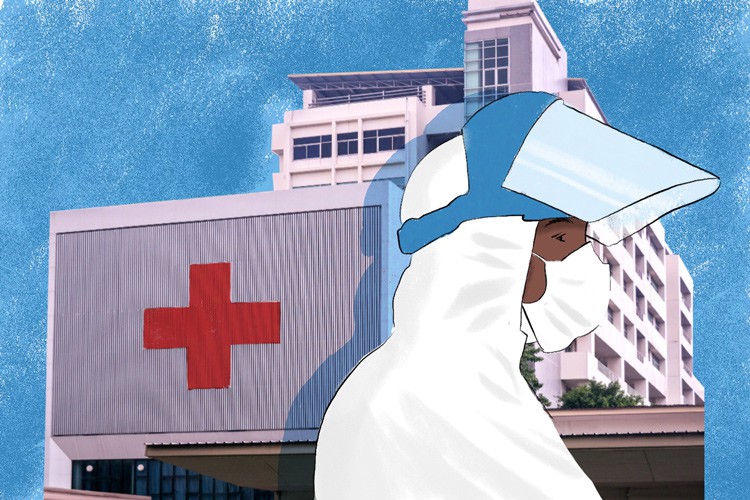Department of Health in last-minute bid to avoid stand-off with nurses over uniforms
Union says nurses will work in their own clothes if uniform allowance is not sorted out
Nurses say they will work in their own clothes if problems with uniforms and uniform allowances are not resolved fast. Graphic: Lisa Nelson
- Nurses in the public sector have threatened to work in their own clothes if problems over uniforms are not resolved this week.
- The uniform allowance nurses have been getting since 2005 was to be replaced this year by the provision of uniforms by the Department of Health, in terms of a collective agreement in March.
- But the Department failed to meet the October deadline for provision of uniforms.
- According to DENOSA, the Department has now put forward a last-minute proposal for a temporary allowance.
The Department of Health is scrambling to avoid a stand-off with nurses who have threatened to work in their own clothes if a dispute over the provision of uniforms is not resolved.
Since 2005, nurses had received an annual allowance to buy their uniforms. But this ended on 31 March this year, after a new agreement was signed in the Public Health and Social Development Sectoral Bargaining Council in terms of which they would get uniforms instead.
As a result, nurses did not get the usual allowance in April - R2,600 a year, according to Spokesperson for the Democratic Nursing Association of SA (DENOSA) Sibongiseni Delihlazo.
Instead, they were supposed to be provided with uniforms by 1 October 2023. The agreement stated that in the first year, government must provide nurses with four sets of uniforms, one pair of shoes, and one jersey. In the second year, government must provide three sets of uniforms, one belt, and one jacket.
The plan was that the procurement process would be centralised. But at another bargaining council meeting, in June 2023, the health department said it would be difficult to provide the uniforms on time.
Then on 12 July, Sandile Buthelezi, director-general for the DOH, issued a circular to all provincial health departments notifying them that the uniforms would be provided from January 2024 to January 2025.
The circular stated that the DOH would use a decentralised approach to providing uniforms by using provincial tenders.
“Provincial heads are responsible for participating and facilitating in tender processes through the bid specification in terms of colour, fabric composition and garment, development, review of the policy and monitoring and evaluation,” Buthelezi wrote.
Until January 2026, the circular said, nurses would be expected to wear the new uniform from Monday to Thursday and wear their old uniform from Friday to Sunday. From January 2026, when they would have both years’ issue, nurses would be expected to wear the new uniforms every day.
DENOSA responded to this a week later, and said the department’s circular went against the bargaining agreement.
Delihlazo said they proposed that if the department is unable to supply the uniform by 1 October, they must pay nurses an allowance as previously.
If the department failed to provide uniforms or pay an allowance, DENOSA said, its 84,000 members would embark on an indefinite protest action by wearing their own clothes to work from 1 October.
Delihlazo said the yearly allowance did not cover the cost of a full uniform. “Their uniforms are tearing and the colour is fading. So how can you expect nurses to wear uniforms if you don’t pay them a uniform allowance?”
He said the tender process meant the colour of the nurses’ uniforms and the quality of the fabrics might differ from one province to the next. The process also “opens a window of opportunity for corruption,” Delihlazo said. “Money may be given for uniforms but the tender process is porous.”.
Then, at a last-minute meeting of the bargaining council last Thursday, the department proposed to put on hold the supply of uniforms until 2024, according to a DENOSA statement. Meanwhile the health department would pay nurses an allowance of R3,153 by 30 November.
DENOSA said the agreement should be signed by the end of the week. If not, the union said, nurses would work in their own clothes.
The health department did not respond to GroundUp’s questions.
Next: Small-scale farmers suffer devastating losses after Western Cape floods
Previous: Old age funding is not keeping pace with our ageing population, report finds
© 2023 GroundUp. This article is licensed under a Creative Commons Attribution-NoDerivatives 4.0 International License.
You may republish this article, so long as you credit the authors and GroundUp, and do not change the text. Please include a link back to the original article.
We put an invisible pixel in the article so that we can count traffic to republishers. All analytics tools are solely on our servers. We do not give our logs to any third party. Logs are deleted after two weeks. We do not use any IP address identifying information except to count regional traffic. We are solely interested in counting hits, not tracking users. If you republish, please do not delete the invisible pixel.



